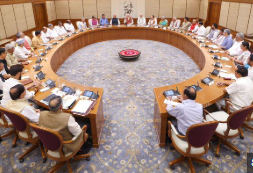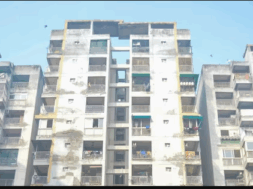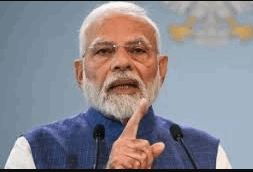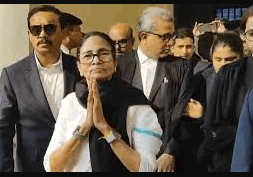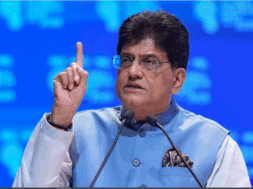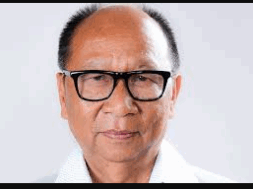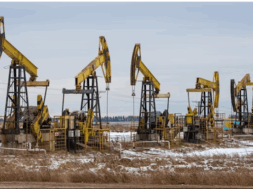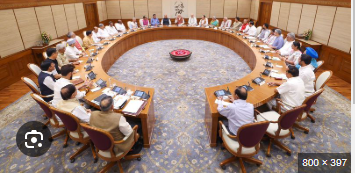
Cabinet Approves Bills to Pave for “One Nation, One Election” Proposal, to be Introduced in Parliament Next Week
Manas Dasgupta
NEW DELHI, Dec 12: The Union Cabinet on Thursday approved three bills required to implement the ‘one nation, one election’ proposal – which proposes simultaneous Lok Sabha and Assembly elections and, at a later stage, municipal polls too – sources said.
These bills – which look to amend at least five Articles of the Constitution and a comprehensive bill on “one nation, one election” are likely to be introduced in the ongoing Winter Session of Parliament. The ruling BJP has issued a three-line whip to all its MPs, asking them to be present in the House on December 13 and 14 for discussions on some important legislative business which are likely to include the bills related to “one nation, one election” move.
The decision was taken at a meeting of the Union Cabinet chaired by Prime Minister Narendra Modi on Thursday. The government is keen on holding wider consultations on Bills which are likely to be referred to a parliamentary committee. Sources said the government was also keen to consult the Speakers of various State Legislative Assemblies through the committee.
Among those approved was an amendment to Article 82, which deals with state-wise allocation of Lok Sabha seats, and division of states into territorial constituencies, after each national census. Two bills will alter the duration and dissolution of the Lok Sabha and state legislative assemblies.
A second amendment relates to linking tenures of the Lok Sabha and state Assemblies, while there will also be changes to provisions in three laws, each looking to align the legislative assemblies of three union territories – Puducherry, Delhi, and Jammu and Kashmir – with those of states and the Lok Sabha as proposed in the first constitutional amendment bill.
The statutes it proposes to amend are the Government of National Capital Territory of Delhi Act-1991, the Government of Union Territories Act-1963 and the Jammu and Kashmir Reorganisation Act-2019. The proposed Bill will be an ordinary legislation not requiring a change in the Constitution and will also not need ratification by the States.
The high-level committee had proposed amendments to three Articles, insertion of 12 new sub-clauses in the existing articles and tweaking three laws related to Union Territories having legislative assemblies. The total number of amendments and new insertions stands at 18.
These are not expected to require ratification by at least 50 per cent of the states, sources said. However, any move to hold local body polls with those for the Lok Sabha and state assemblies will require ratification by at least 50 per cent of the latter, as it deals with matters relating to state affairs.
Legal experts have warned that failure to do so will leave the proposal open to attack on charges of violating India’s federal structure. On Wednesday former President Ram Nath Kovind, who leads the panel tasked with making ‘one nation, one election’ a reality – called on the government and the states to build a consensus. “This issue is not in the interest of any one party… but the nation. It will be a game-changer,” he said.
Economists consulted had predicted a 1 to 1.5 per cent boost in GDP, he declared. In September the Cabinet had cleared the Kovind panel’s report. The panel – which included Home Minister Amit Shah and Law Minister Arjun Ram Meghwal as members – had said “there is unanimous opinion that simultaneous polls should be held.”
Simultaneous polls will “transform the electoral process (and) governance” and “optimise scarce resources”, the panel had said, noting that 32 parties and prominent judicial figures, including former Supreme Court Chief Justices and High Court judges, had backed this measure.
Among the advantages claimed were that it makes the electoral process easier, and that synchronising will also boost economic growth; the argument was that a single round of elections will allow businesses and corporate firms to take decisions without fear of adverse policy changes. The ‘one nation, one election’ push will also “prevent policy paralysis”, and do away with the “atmosphere of uncertainty” due to frequent elections, the government had in turn argued.
Apart from syncing electoral cycles with minimum disruption to governance (and ensuring all political parties are onboard), there is still no real clarity on how to deal with breaks due to dissolution of Houses, President’s Rule, or even a hung Assembly or Parliament. Regional parties have also pointed out their limited resources means they may not be able to spotlight local issues to voters, as effectively as they might, in the face of better-funded parties trying to grab attention for the Lok Sabha election.
Another area of concern is the recurring cost of procuring EVMS, or electronic voting machines. This, the poll panel has said, will be nearly ₹ 10,000 crore every 15 years. The ‘One Nation, One Election’ panel received nearly 21,000 suggestions from the public, of which over 81 per cent were in favour, sources said.
On Wednesday, Union Agriculture Minister Shivraj Singh Chouhan made a strong pitch for ‘one nation, one election’, and contended that frequent polls were creating hurdles in the nation’s progress.
Addressing an event in Kurukshetra as part of the ongoing International Gita festival, Mr Chouhan said the country was moving ahead rapidly under the leadership of Mr Modi. “A glorious, prosperous and powerful India is being built under the leadership of the prime minister. But there is one hurdle in India’s progress and development, which is frequent elections. Any other thing may be happening or not in the country, but election preparations continue for twelve months all five years,” he said.
The Cabinet has already approved the Ram Nath Kovind Committee’s report on the proposal, which advocates simultaneous elections across the country. In its report submitted to the government in March, just before the general election was announced, the panel recommended implementing one nation, one election in two phases.
